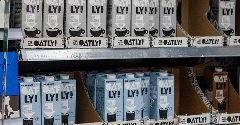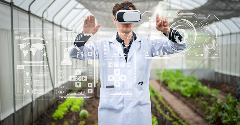News
Making coffee farming more sustainable
26 Oct 2022Interest in a circular economy model is increasing among coffee players as calls for positive environmental action proliferate the supply chain.
“Our agricultural system needs an urgent overhaul,” Miguel Gamboa, coffee sector lead at international non-profit organisation, Rainforest Alliance told Ingredients Network.

In June 2022, the UK’s Department for Environment, Food and Rural Affairs (Defra) announced the publication of its recent consultation outcome. The consultation surrounded the implementation of due diligence provisions in the Environment Act 2021 through secondary legislation to combat illegal deforestation in UK supply chains.
“The coffee industry has been well aware for some time of the need to increase sustainability and indeed the benefits which come from that,” says Paul Rooke, executive director of the British Coffee Association (BCA).
Bringing forward legislation such as that concerning forest risk commodities, including coffee, gives the industry an “opportunity to highlight the benefits that production techniques such as shade coffee bring to tackling deforestation and indeed focus on reforestation”, he says.
Pursuing sustainability in coffee production
Transitioning to regenerative agriculture is high on the agenda. Regenerative agriculture has strong roots in Indigenous farming practices, says Gamboa. While sustainable agriculture seeks to lower the detriment of conventional methods, such as using harmful agrochemicals on land, regenerative agriculture progresses beyond a harm-reduction approach to restore ecosystems and add to nature.
“Creating a more sustainable system is a journey and the destination should be regenerative agriculture,” he adds. Mapping risks, such as impacts of climate change and biodiversity loss, can enable farmers to make decisions supporting their transition to a more regenerative production system.
According to Gamboa, coffee farming can present both risks and opportunities for biodiversity conservation. Agroforestry techniques can protect biodiversity by planting shade trees, increasing soil fertility and health and improving carbon sequestration. These techniques can increase crop resistance to pests and diseases, promoting more robust yields and lowering the need for external inputs like pesticides.
Delivering best-practice agronomic outreach is undertaken via individual businesses or third-party coffee operations such as Global Coffee Platform. The World Coffee Research, for example, focuses on varietal development through plant breeding and bringing enhanced varieties to producing countries for evaluation.
Projects are also exploring water usage, specifically how processing mills can reduce or increase the level of water recycling. Simultaneously, there is growing interest in how waste material from coffee processing, like coffee pulp and husks, might be used as fertiliser, soil nutrients or renewable energy sources.
“Coffee is a sustainable product and has the opportunity to go beyond net zero and become a net positive commodity for carbon with the potential for innovation to allow producers to be able to financially benefit from their ability to take in carbon,” says Rooke. The industry is also exploring how the coffee-producing sector might increase its ability to capture and store carbon in soils acting as an overall carbon sink.
 © AdobeStock/Bluesky60
© AdobeStock/Bluesky60
Coffee commitments
Global coffee name Nestlé has launched a new initiative to help coffee farmers transition to regenerative agriculture. Through its initiative, Nestlé Plan 2030, the coffee producer aims to work with farmers to obtain 100% responsibly sourced coffee by 2025. Nestlé also sets out to source 20% of coffee from regenerative agricultural methods by 2025 and 50% by 2030.
The Rainforest Alliance and Nespresso have developed the Regenerative Coffee Scorecard — a voluntary tool to help coffee companies move to regenerative farming. It identifies farmers’ current performance and tracks improvement towards regenerative goals.
Swiss supermarket chain Migros set its sights on changing how we make coffee at home to reduce the amount of aluminium and plastic capsules in landfills. The company has launched its CoffeeB system, which uses automation to provide capsule-less coffee, removing the need to dispose of or recycle capsules.
Changing the coffee production of tomorrow
By focusing on environmental, economic and social sustainability, the industry will see opportunities for improving access to digitalisation at the producer level. In turn, this allows producers “much greater access to agronomy advice, to greater market information return and to services which will improve the efficiencies within the supply chain”, Rooke says.
Improving the overall research and development (R&D) input, particularly in plant genetics, will help enable producers to evaluate new varieties. The approach can create increased yield and positive sustainability factors such as improved water use efficiency, increased nutrient uptake and greater natural protection against pests and disease.
Collaboration is integral to achieving sustainability ambitions in the coffee industry. “Scaling regenerative agriculture in the coffee sector should not fall on the shoulders of farmers alone — it will take a joint effort from actors across the supply chain,” says Gamboa.
Related news

UK High Court allows Oatly to use 'milk' on packaging
17 Jan 2024
Oatly has scored a landmark victory in the use of the word milk after the UK High Court ruled against the country’s dairy industry and permitted the term to be used on packaging.
Read more
Chobani expands drink presence with La Colombe acquisition
16 Jan 2024
Greek yoghurt giant Chobani has purchased US coffee brand La Colombe Coffee Roasters for $900 million, furthering its expansion into beverage categories like coffee, oat milk, creamer and ready-to-drink offerings.
Read more
PepsiCo to reshape convenient foods portfolio with less sodium and more plant proteins
10 Jan 2024
PepsiCo has revealed details of two nutrition goals that look to reduce sodium and boost consumption of legumes, whole grains, and plant-based proteins as part of the multinational’s expanded convenient foods portfolio.
Read more
Meet the innovative ingredients showcased at Fi Europe’s New Product Zone
3 Jan 2024
The Food Ingredients category at Fi Europe’s New Product Zone featured 19 distinct and innovative products. From fermented delights to sustainable proteins, these ingredients are ready to make their mark in the market.
Read more
Fi Europe’s New Product Zone elevates the nutrition of everyday indulgences
22 Dec 2023
At Fi Europe 2023's New Product Zone, eight health ingredients, each offering an enhanced nutritional profile of various products, were on display. These ingredients address the evolving needs of the food and beverage industry and cater to consumers se...
Read more
MyAir plans to expand personalised adaptogen products to UK
15 Dec 2023
After launches in Japan and the US, B2B personalised nutrition company MyAir is eyeing the UK market with its white-label functional food and drink products. “Taste is a must – but it's not enough,” says its CEO. “Food has become functional and persona...
Read more
Augmented technology is the gateway to new food experiences
13 Dec 2023
Harnessing augmented reality as a digital tool could offer consumers increasingly personalised food and beverage experiences, opening up new ways to see and taste products, according to a report by Canvas8 and Givaudan.
Read more
Colombia introduces tax on ultra-processed foods
7 Dec 2023
In a bid to curb rates of obesity and other non-communicable disease, the Colombian government has introduced a tax on various ultra-processed food (UPF) and drink products.
Read more
Snack trends, ingredient claims, and plant-based perceptions: Highlights from Fi Europe 2023, part 1
7 Dec 2023
Value-led snacking, sustainability storytelling, and the importance of having a ‘star ingredient’: we asked consumer analysts and market experts at Fi Europe about the trends and innovations that are shaping the food industry.
Read more
Consumers want more plant-based meat without GM ingredients
28 Nov 2023
Plant-based meat has been a hot and popular category for several years, but not all North American shoppers are embracing vegetarian alternatives that contain genetically modified (GM) ingredients, according to the Non-GMO Project.
Read more